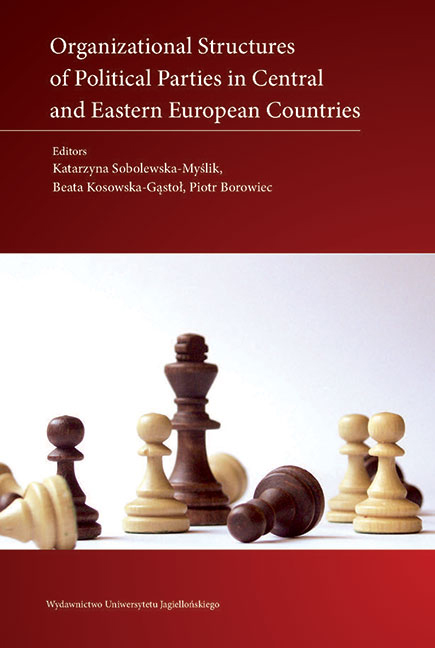Book contents
- Frontmatter
- Contents
- Preface
- Developing Party Structures in Central and Eastern Europe
- Albania: Organizations of Political Parties in Albania
- Belarus: Belarusian Political Parties: Organizational Structures and Practices
- Bosnia and Herzegovina: Organizational Structures of Political Parties in CEE Countries: A Case Study on Bosnia and Herzegovina
- Bulgaria: Organizational Structure and Trends in Bulgarian Party Politics
- Croatia: Organizational Structures of Political Parties in Croatia
- Czech Republic: Between Organizational Extremes: Czech Parties after a Political Earthquake
- Estonia: Organizational Structures of Political Parties in Estonia
- Hungary: Cut from the Same Cloth? A Comparative Analysis of Party Organizations in Hungary
- Kosovo: Structure of the Main Political Parties in Kosovo
- Latvia: Leader-Centered and Power-Hungry: Party Organizations in Latvia
- Lithuania: Organization of Political Parties: The Case of Lithuania
- Moldova: Organizational Structures of Political Parties in The Republic of Moldova
- Montenegro: Party Organization in Montenegro: Structural Resemblance Behind Political Divergence
- Poland: Structures of Polish Political Parties in the Second Decade of the 21st Century
- Romania: The Internal Organization of Romanian Political Parties
- Russia: Parties with Roots Growing Upwards: Organizational Features of Russian Political Parties
- Serbia: Organizational Structures of Political Parties in Serbia
- Slovakia: Organizational Structures of Political Parties in Slovakia: Parties not for Members
- Slovenia: Almost without Any Innovations: Organizational Structures in Slovenian Parties
- Ukraine: Shallow Party Structures in a Volatile Party System
- Comparing Organizational Structures of Political Parties in Central and Eastern European Countries
- Biographical notes about the authors
Montenegro: Party Organization in Montenegro: Structural Resemblance Behind Political Divergence
- Frontmatter
- Contents
- Preface
- Developing Party Structures in Central and Eastern Europe
- Albania: Organizations of Political Parties in Albania
- Belarus: Belarusian Political Parties: Organizational Structures and Practices
- Bosnia and Herzegovina: Organizational Structures of Political Parties in CEE Countries: A Case Study on Bosnia and Herzegovina
- Bulgaria: Organizational Structure and Trends in Bulgarian Party Politics
- Croatia: Organizational Structures of Political Parties in Croatia
- Czech Republic: Between Organizational Extremes: Czech Parties after a Political Earthquake
- Estonia: Organizational Structures of Political Parties in Estonia
- Hungary: Cut from the Same Cloth? A Comparative Analysis of Party Organizations in Hungary
- Kosovo: Structure of the Main Political Parties in Kosovo
- Latvia: Leader-Centered and Power-Hungry: Party Organizations in Latvia
- Lithuania: Organization of Political Parties: The Case of Lithuania
- Moldova: Organizational Structures of Political Parties in The Republic of Moldova
- Montenegro: Party Organization in Montenegro: Structural Resemblance Behind Political Divergence
- Poland: Structures of Polish Political Parties in the Second Decade of the 21st Century
- Romania: The Internal Organization of Romanian Political Parties
- Russia: Parties with Roots Growing Upwards: Organizational Features of Russian Political Parties
- Serbia: Organizational Structures of Political Parties in Serbia
- Slovakia: Organizational Structures of Political Parties in Slovakia: Parties not for Members
- Slovenia: Almost without Any Innovations: Organizational Structures in Slovenian Parties
- Ukraine: Shallow Party Structures in a Volatile Party System
- Comparing Organizational Structures of Political Parties in Central and Eastern European Countries
- Biographical notes about the authors
Summary
Introduction
Montenegro, along with Serbia, was one of the last former-socialist states in Europe to witness the introduction of multi-party political competition. The ancien regime, organized around the politically unchallenged Montenegrin League of Communists (“Savez komunista Crne Gore”), came to the end in the late 1980s. The first political organizations outside the structures of the ruling party were established in the first half of 1989. Nonetheless, they were not officially legalized for another year.
The new Law on Citizens’ Association (“Zakon o udruživanju građana”), that prepared the ground for the regime change in Montenegro, was adopted by its Parliament on 11 July, 1990. Soon after, the Parliament passed amendments No. 64 through 82 to the 1974 Constitution of the Socialist Republic of Montenegro, which abolished the delegate model of political representation and allowed for direct multi-party elections. Finally, the first formally democratic general elections in Montenegro took place on 9 December, 1990 (Goati 2001). Throughout the subsequent quarter-century, the country has gone through a period of extremely turbulent political development. This turbulence has been marked by: the 1992–1995 collapse of former Yugoslavia; the 1992 creation of a new federal state of Montenegro and Serbia, dominated by Serbian strongman Slobodan Milošević; the breakaway of the pro-Western Montenegrin government, and the country's genuine democratization following the 1997 division of its ruling party; the renewal of Montenegro's independence in 2006; and its gradual advancement along the path of EU and NATO integration.
Since 1990, the main party organizations in Montenegro have been more or less successful in adapting to rapidly-changing political circumstances. Founded on the organizational principles of the former highly-institutionalized League of Communists, the aforementioned Democratic Party of Socialists has demonstrated the largest capacity for programmatic and structural transformation. As noted by Vuković: “Once the pillar of the Montenegrin hybrid regime, the DPS played a key role in the country's democratization after the 1997 split within its leadership. Moreover, having been the most vocal advocate of a state federation with Serbia for more than a decade, it became the main political force behind the renewal of Montenegrin independence” (Vuković 2015: 73).
- Type
- Chapter
- Information
- Organizational Structures of Political Parties in Central and Eastern European Countries , pp. 295 - 310Publisher: Jagiellonian University PressPrint publication year: 2017



